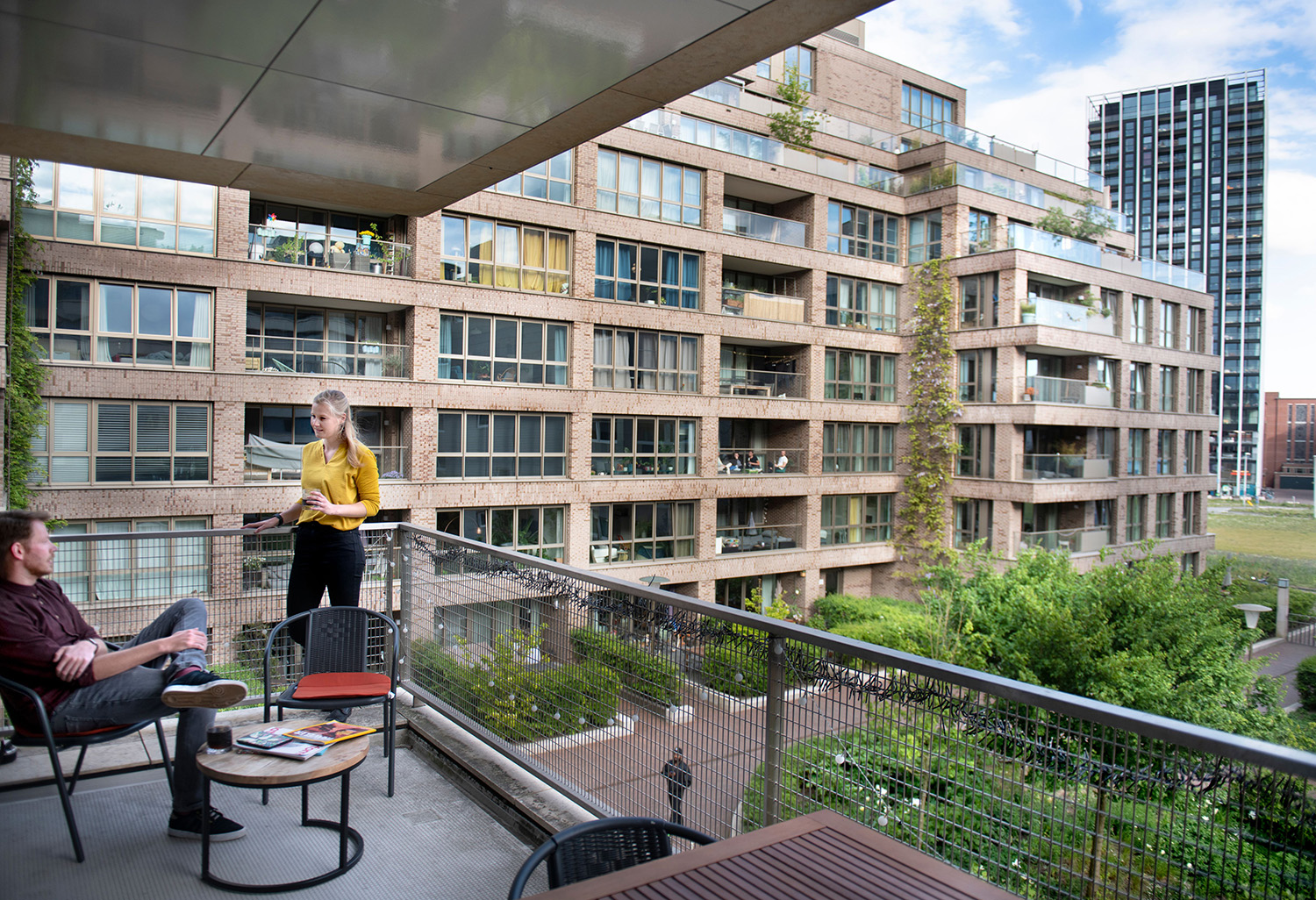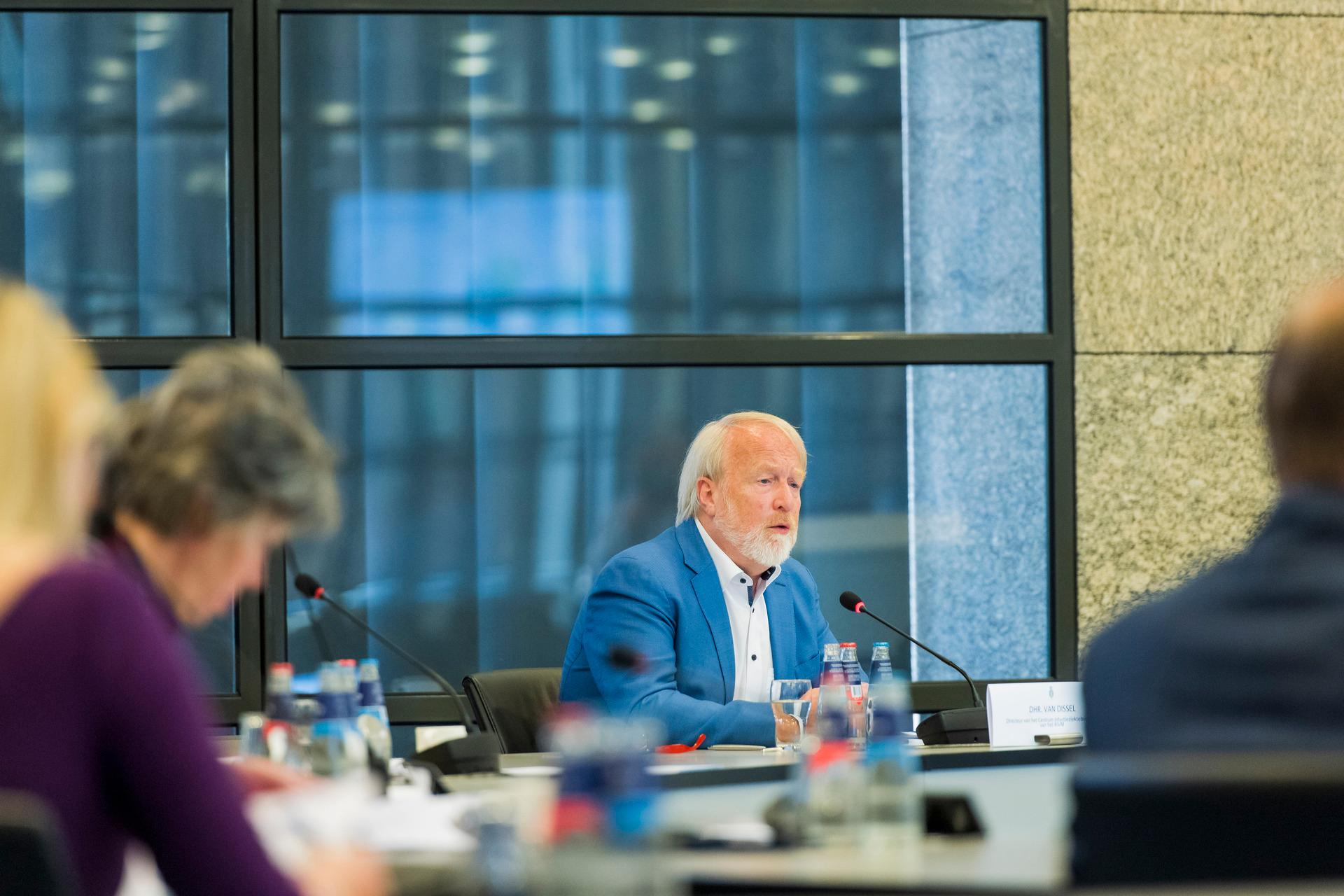“I have been teaching about infectious diseases for over 20 years, but never before have I included lockdown in my lectures”

The Outbreak Management Team (OMT) has been working overtime. This group of specialists and experts from RIVM and elsewhere, all contributing from different backgrounds, are constantly working in close consultation to determine the best way to control the coronavirus outbreak. The OMT plays a key role in advising the Dutch government on this matter. Chair of the OMT is Professor Jaap van Dissel, as Director of RIVM’s Centre for Infectious Disease Control. How have the members of the OMT experienced the coronavirus crisis so far? “We thought we understood how this virus behaves, but we still keep getting surprised at every turn.”
|

Jaap van Dissel at a technical briefing in the House of Representatives (Dutch: Tweede Kamer, the Lower House of Parliament)
The coordinator of the COVID-19 response
Aura Timen
Primary task: I have two jobs, which have kept me working flat-out since mid-January, weekdays and weekends. I have only had two days off in all that time. I am leading the COVID-19 response, as head of the National Coordination Centre for Communicable Disease Control (LCI). My second job is the Scientific Secretary to the OMT. I am also Jaap van Dissel’s deputy for communicable disease control and questions from the press.
Struggled most with: The feeling of always playing catch-up and not being able to do much about it. We thought we understood how this virus behaves, but we still keep getting surprised at every turn. In the meantime, we still have to offer recommendations on how to fight it.
But as we discover new information about the virus in retrospect, it is quite a huge undertaking to adapt the recommendations. Standard practice for infectious diseases is to identify new insights and incorporate them into the response – but new information seems to be perceived differently here. In this case, we immediately get told, “Oh, so you were wrong, you saw it too late, you were not taking this seriously enough.” It is really hard to cope with, honestly, that everyone has an opinion that they need to get out there.
Gets energy from: My colleagues at LCI. They are all extremely motivated people who are there, day in and day out, getting things done. I never cease to be amazed at how driven and dedicated they are! And there are so many others who stay closely involved from a distance, are behind us, calling in, offering help. As a side note, it gives me great pleasure to tell you that we just celebrated an anniversary: on 13 June, the Centre turned 25!
Key weapon in the fight against coronavirus: The “intelligent lockdown”. I have been teaching about infectious diseases for over 20 years, for the last two as a professor at Vrije Universiteit Amsterdam. But never before have I included lockdown in my lectures, except from examples from past centuries. And I certainly never thought that I would ever be experiencing one in my working life. We have not seen an entire society shut down, or even partially shut down, for a hundred years.
Primary task: Contributing my expertise in virology to the OMT. Our department at Erasmus MC, the Viroscience department where I work as a professor of virology, is doing a tremendous amount of research on viruses at the human/animal interface, particularly looking at the viruses that pose a pandemic threat. We devote this expertise to research and advisory assistance.The virologist
Marion Koopmans, professor of virology at Erasmus MC
As soon as the first signs started coming out of Wuhan at the end of December, we have been fully focused on SARS-CoV-2 [the full name for the novel coronavirus that can cause COVID-19 -- eds.]. Our contribution is in the form of clinical research, development on diagnostics, pathogenic research [research into the emergence, development and course of diseases -- eds.], immunity research, molecular epidemiology studies and research on treatments.
Struggled most with: The fact that I am suddenly such a public figure. I cannot say anything at all now without everyone in the world having an opinion about it. Thinking out loud is usually part of how I process a situation like this, but it is not really possible anymore. I also have difficulty with the lack of international cooperation and the fragmented approach being taken in the research world. I worry that this fragmentation is going to mean that it will take us a lot longer to arrive at any conclusions. And yes, it also pains me that – despite all our knowledge and experience – we are still empty-handed at the end of the day.
Gets energy from: Being able to contribute to the response with my knowledge and my team’s knowledge.
Key weapon in the fight against the coronavirus: That we will be able to closely monitor the development of the virus with genetic analysis and supplemental studies in the near future. We also have focus on research into treatment and prevention. I expect that this virus will keep coming back, so we are going to need that.
In the past few months, fundamental new insights into the pathogenesis of this virus have been discovered, which could give us new starting points for treatment. We all have to come together now to ensure that these scientific advancements go as fast as possible and that includes partnering in trials.
Goals: In a subsequent wave, I want us to have access to something that can protect the most high-risk patients, for example plasma therapy. And, most of all, I hope we learn from this pandemic that we absolutely need systemic, large-scale investment in preparedness research: studying the best way to be prepared for large-scale outbreaks. These types of viruses had been on the list of pandemic threats for years, these and a whole host of others. I think that this has been a real wake-up call.
The modeller
Jacco Wallinga
Primary task: I am head of the department of Infectious Disease Modelling. The modellers in my department are hard at work running the numbers on how and when to introduce measures or open up more, forecasting the demand for care, calculating the required intensity of control, and determining the reproduction number (R) of the virus. We also set up surveillance tools based on online technologies and mobility.
Right now everyone is being pushed incredibly hard. My most important task is to make sure that the critically important things are being handled properly and that everyone has what they need to keep doing their jobs right.
Struggled most with: Not having enough time to read and answer all the e-mails with offers for help. It was heartwarming to see how everyone came together in offering assistance. But the questions that we faced in this crisis were very unpredictable, so it turned out to be difficult to make use of all the help that was offered. Setting up new partnerships is no easy task in the midst of a crisis. Setting up triage points for this was an obvious choice.
Gets energy from: The family at home, where building with Lego is much more important than the coronavirus epidemic. And satisfaction comes from the tremendous amount of work getting done inside RIVM. Sometimes we get cards and e-mails from random strangers from all over, thanking us for our work. So extraordinary, and it is really motivating to get that encouragement.
Key weapon in the fight against coronavirus: Perspective! Epidemics like this one do not happen often in the Netherlands, but if you look back through the centuries, they have happened on more than one occasion. And as bad as it is, people have always found a way to adapt and go on living.
Goals: Preventing the epidemic from getting out of hand. Think about what the Netherlands would look like if the healthcare system were overwhelmed, hospitals were overflowing, and someone in your household was deathly ill but could not arrange access to healthcare. When you look around and see what is happening elsewhere in the world, you know that it could have happened here. That has been prevented in the Netherlands.
Would you like to know more?
Read more about the Outbreak Management Team (OMT) and the fight against infectious disease
Read more about modelling at RIVM


